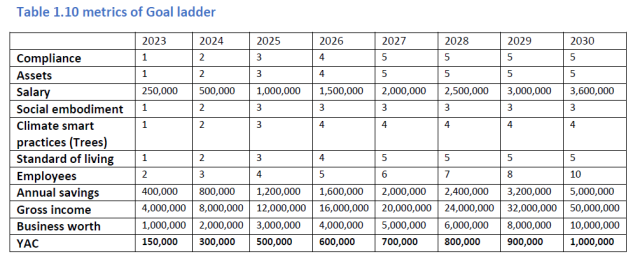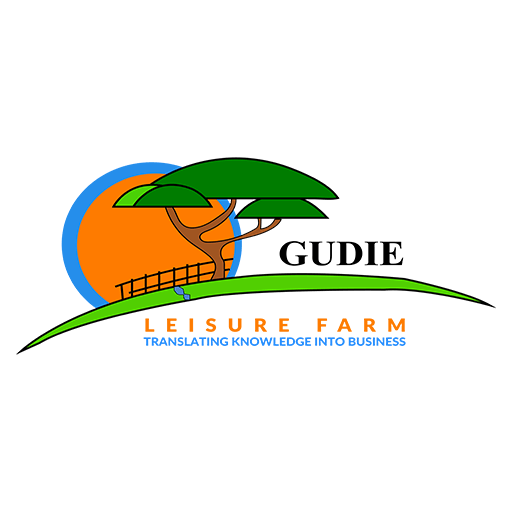On our transformational journey we envisage a world where there is critical mass of 1,000,000 Ugandans by 2030 living a high quality of life and shaping the future of their off springs and communities. To achieve this, we need to monitor and track our progress quarterly against the expected. We need to constantly study the trends and devise means of being on track. The critical mass of model Ugandans has a role of transforming their regions and being the light of transformation. To achieve the regional transformation, there is a need to increase the footprint in each region to not less than five districts per region.
The ten metrics of growth is our measure of the growth of the transformers. We measure business worth, gross income, savings, number of employees, standards of living, embracing climate smart practices, social embodiment, monthly income, accumulation of assets and being compliant. For each we have a goal ladder that is a guiding campus for the individual Youth Agripreneur Champion

1. Business worth
Youth Agripreneur Champions (YACs) driving the transformational journey ought to own a business that has goals to increase its worth year after year. Business worth is obtained through adding up the value of everything the business owns, including all equipment and inventory and then subtracting any debts or liabilities. In 2020, we started with YACs that had no business and we have seen businesses growing year by year. Our ambition is to see 1,000,000 YACs with a business not less than UGX 10,000,000 by the year 2030. That would mean that the business worth of the ecosystem would be UGX 10 Trillion.
2. Business monthly gross income
We want to be counted for standing with the moto “of one to give four”. For every business investment we expect the business to make an income four times the investment. We implore all YACs to continuously carryout cost benefit analysis to the point that the business they are running makes an income four times its size. We need to constantly monitor our income.
3. Savings
Saving is key for social cohesion and to enable the Youth Agripreneur Champions have a pool of resources they can tap into with low entry barriers to bolster their growth. In addition, it is an avenue that enables YACs to participate in the money economy where their money makes money for them. The minimum savings are 10% of one’s income. It is recommended that this money is saved at the PELA Savings and Loan Association (PSLA). Then the PSLA further invests at least 30% of its savings into GAM to enable access to more funds at low interest rates for onward lending to its members. By the end of the Year 2030 each YAC will be saving not less than UGX 5,000,000 per year.
For every business investment we expect the business to make an income four times the investment.
4. Number of employees
Employment creation is key in transforming families and communities. Each growing business must aspire to create employment. This can be for family members or for the community at large. Each YAC is expected to create 10 jobs by the end of 2030. Our commitment is to create 10,000,000 jobs in the network. These employees should earn a minimum of 3,600,000 a year.
5. Standards of living
This is measured using Maslow hierarchy of needs: physiological, safety, love and belonging, esteem and self- actualization. We want to achieve all the five by the year 2030. This will give us a happy population that will drive transformation.
6. Embracing climate smart agriculture
This is measured on 4 parameters running a zero waste business, embracing organic farming, planting trees and use of clean energy. The YACs will live longer and therefore have the obligation of creating an ecological footprint that enables them to benefit from the ecological ecosystem services sustainably. By the end of 2030 each YAC and their networks should embrace all the four. They should have planted 1,000 trees. We envisage 1 TN trees by the end of 2030. These trees should be trading on the carbon credit market. The trees should be of value in the value chain – fruits, medicinal, food and source of renewable energy.
7. Social embodiment
We build the network to increase the social capital of the members. This enables members to pool resources that support one another at the time of need. Three obligations are prioritized – a social fund for celebrating milestone, a health plan fund for securing our health and the down time fund that lifts our members up at the time of their lowest , death, loss of business and the like. In our different PELAs we commit to increase our social capital so that we benefit from our network.
8. Salary
We embrace agribusiness that provides us with a fulfilling and dignified job measured by our salary. Our minimum salary expectation by the year 2030 is 3,600,000 per month.
9. Assets
As we continue to earn we want to see ourselves have assets that earn especially passively or enable us to access capital to grow further. We are looking at assets that enable us to earn daily, enable us to earn when we are sleeping and enable us to earn without any extra effort. The type ranges from PELA to PELA however we are looking at assets like land, rentals, trees, stocks, shares and the like. The focus is on risk free assets.
10. Compliance
This is a gateway to growth opportunities. We are focusing on being registered either at the subcounty, District and the Uganda registration services bureau (URSB), Our products being certified by the Uganda National Bureau of standards (UNBS), Securing ourselves and the future of our employees through the National social security fund (NSSF), Managing our finances responsibly, keeping business records, having audited accounts and complying with Uganda revenue authority(URA), trading license, local service tax, Pay as you earn, withholding tax and income tax among others and also complying with the
